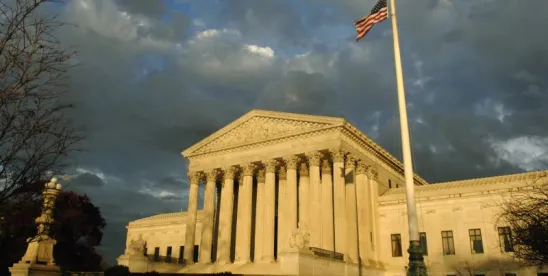The U.S. Supreme Court recently expanded an employee’s ability to meaningfully litigate retaliation claims against employers in two (2) significant opinions. First, on January 24, 2011, the Court unanimously held that the anti-retaliation provisions of Title VII of the Civil Rights Act of 1964 (“Title VII”) protects third parties. Thompson v. North American Stainless, LP, 131 S.Ct. 863 (2011) (terminated employee may bring retaliation claim arising out of his fiancée’s prior complaint of gender discrimination to the Equal Employment Opportunity Commission (“EEOC”)). This landmark decision opened the floodgates to potential retaliation claims by third–parties under Title VII by failing to provide employers with a bright-line rule regarding the types of relationships and factual scenarios which are protected under Title VII’s anti-retaliation provision.
In that case, Eric Thompson and his fiancée, Miriam Regalado, were both employed by North American Stainless (“NAS”). Thompson and Regalado met at NAS, began dating and ultimately became engaged to marry. Their relationship was known to the company. In February, 2003, the EEOC provided notice to NAS that Regalado had filed a charge of gender discrimination against NAS. Approximately three weeks later, NAS dismissed Thompson. Thereafter, Thompson filed a charge with the EEOC alleging that he was terminated in retaliation for his fiancée’s prior charge of gender discrimination.
The district court ruled in favor of NAS on the grounds that Title VII does not permit third-party retaliation claims. Thompson appealed. The Sixth Circuit Court of Appeals affirmed, holding that Thompson did not engage in any activity protected by Title VII and, therefore, he was not within the class of persons who had standing to bring a retaliation claim under Title VII. The Supreme Court unanimously disagreed, reasoning that Thompson was not an “accidental victim of the retaliation-collateral damage” and concluded that Thompson’s interests were well within the “zone of interests” that Title VII is intended to protect. The Court did not articulate a basis for determining when a potential third-party claimant’s interests qualified for Title VII protection. Rather, the Court declined “to identify a fixed class of relationships for which third-party reprisals are unlawful.”
The Supreme Court issued a second decision in 2011 that expanded the ability of a claimant to bring a retaliation claim. The Fair Labor Standards Act (“FLSA”) provides that it shall be unlawful “to discharge or in any other manner discriminate against any employee because such employee has filed any complaint . . . . under or related to this chapter . . . .” (emphasis added) In Kasten v. Saint-Gobain Performance Plastics Corp., 2011 WL 977061 (2011), the Court held that the anti-retaliation provisions of the FLSA protect both oral and written complaints pertaining to alleged violations of the FLSA. Similar to the decision in Thompson, the Kasten holding expands legal protections to employees asserting retaliation claims and puts employers in a quandary by not defining precisely what types of oral statements constitute the filing of a complaint that later may support a retaliation claim.
Kevin Kasten, a former factory worker in a Saint-Gobain plant, filed an action against his employer alleging that he was terminated after making an oral complaint to company officials pertaining to the location of the time clocks in the factory. The trial court granted summary judgment to Saint-Gobain, and the Seventh Circuit Court of Appeals affirmed, holding that the FLSA’s anti-retaliation provisions did not protect (or extend to) oral complaints. The U.S. Supreme Court, however, concluded that FLSA retaliation claims could be premised upon oral complaints and dealt a significant blow to employers when it held that if a “reasonable, objective person would have understood the employee to have put the employer on notice that the employee is asserting statutory rights under the Act,” then the oral comment is deemed to be a “complaint” that is “filed” and, therefore, protected activity under the FLSA. Significantly, and similar to its holding in Thompson v. North American Stainless, the Supreme Court again failed to provide any definitive parameters pertaining to the manner in which oral complaints should be “filed” or with whom they must be “filed.”
The ramifications of the Thompson and Kasten decisions for employers are far reaching. Retaliation claims already comprise a significant portion of all federal employment discrimination claims. The Supreme Court’s 2011 expansion of retaliation claims to allow both oral complaints under the FLSA and complaints by individuals other than the uniquely affected person will undoubtedly tee up years of litigation that will test, on a case-by-case basis, the limits of the expanded protections provided by these recent Supreme Court decisions.
Accordingly, prudent employers must cautiously analyze the relationships between fellow employees in order to recognize the potential ramifications of all dismissal and disciplinary decisions to determine if the employer’s action could spawn a retaliation claim because the disciplined or terminated employee’s relative (or fiancé) previously complained about some protected workplace event that preceded the contemplated discipline or dismissal. Additionally, in response to Kasten, employers should train supervisors to adequately document and respond to oral complaints and, perhaps more importantly, how to differentiate (assuming that is even possible) between an employee who is simply grousing without intending to make a formal complaint and an employee who is genuinely attempting to lodge a complaint with his or her employer. Ultimately, the U.S. Supreme Court’s decisions in 2011 remind employers of the age-old advice to “document, document, document” so that employers are prepared to defend their personnel decisions should a claim arise.
Submitted April 2011 to National Law Review




 />i
/>i

